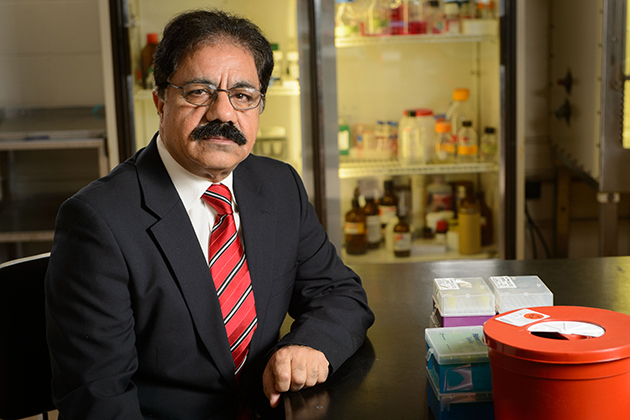
When an influenza virus that normally only affects birds jumped to human hosts in China earlier this year, both the U.S. Centers for Disease Control and Prevention and the World Health Organization were quick to say that such cases are highly unusual and to confirm that the virus does not spread easily from person to person.
Nevertheless, UConn researcher Mazhar Khan, professor of pathobiology in the College of Agriculture and Natural Resources, was keenly interested in the news.
Khan develops DNA-based diagnostic tests for the detection of animal diseases, as well as vaccines for avian influenza. He also has a long relationship with the People’s Republic of China that dates back to the mid-1990s, when a visiting scholar came to UConn to learn diagnostic DNA techniques.
“We have had a steady stream of scientists coming to study here [in the pathobiology department] over the past 15 years,” he says, ”and during this time I have traveled to Guangxi University in the capital city of Nanning nearly every year to lecture and help develop their diagnostic skills.”
Khan says he has seen veterinary medicine in China improve tremendously, and the lab at the Veterinary Research Institute in Nanning is now flourishing. “The city itself has become totally modern since I first visited there, with skyscrapers and automobile traffic and all the other things you see in any big city,” he says. “But the surrounding region is still one of China’s most important agricultural areas with huge flocks of ducks and chickens, as well as cattle, pigs, and sugar cane production.”
He notes that despite the rapid modernization of the country, supermarkets are virtually non-existent. China still relies heavily on small markets that sell fresh produce, fish, meat, and live poultry. It is in these live poultry markets that infected birds can easily spread avian influenza, commonly referred to as bird flu, thus placing entire domestic flocks of ducks, chickens, and turkeys at risk for the disease, as well as exposing humans to the virus.
This was apparently the case recently, when a 36-year-old woman visited the town of Shenzhen, in China’s Guangdong Province, where she slaughtered and ate a chicken. According to health officials, she became ill after returning to Hong Kong and was hospitalized with fever, chills, and breathing difficulty. She subsequently tested positive for the H7N9 strain of bird flu, which can be fatal to humans.
Although some live-bird markets in various parts of China have been eliminated, there are age-old cultural precedents, as well as expenses that would be incurred by small poultry producers if they had to change their procedures for getting birds to market, that make the total elimination of live sales problematic, according to Khan.
In addition, there are strains of avian influenza that originate in wild bird populations, including waterfowl, which put domestic flocks at risk.
“The earlier the disease is identified,” says Khan, “the sooner we can vaccinate domestic birds and stop the spread of the virus. Flocks that are vaccinated have a lower incidence of infection, and if influenza does occur, we have a much better chance of stopping its spread and having lower mortality rates.”
Public health priority
Although most strains of avian influenza do not cause illness in people, certain strains – such as H5N and H7N9 – can do so. In addition, WHO has documented cases of the H5 and H7 low-pathogenicity avian influenza viruses that have mutated to high-pathogenicity viruses. That’s why, says Khan, WHO keeps a keen eye on outbreaks of avian influenza throughout the world. Although remote, the possibility of a pandemic is still a possibility and any effort to control outbreaks is viewed as a public health priority.
Khan’s research in detecting these viruses and initiating effective control programs through vaccination of domestic birds recently earned him an award from the People’s Republic of China: the Friendship Award, the highest honor for foreigners who have made ‘exceptional contributions to China’s economic and social progress.’ He was one of 50 honorees from 20 countries to receive the 2013 award, which is given annually to foreign experts representing fields such as education, technology, economics, and culture.
It was both Khan’s expertise in avian influenza and his longstanding relationships with Chinese academics and scientists that put him in the spotlight at The Great Hall of the People in Beijing, where the honorees were greeted by China’s premier, Li Keqiang.
He says the award was a surprise. “It’s a complicated process, with nominations coming in from many areas. I knew that my colleagues at the Guangxi Veterinary Research Institute and the Guangxi Bureau of Agriculture had nominated me, but with over 500,000 international experts representing various fields working in China at any one time, it was still a long shot. … It was very special to have won the award.”
Speaking at the award ceremony, Chinese Vice-Premier Ma Kai emphasized the importance of relationships between international experts and the Chinese people. “They are a bridge for communication between China and other countries,” he said, “and an important force for China’s development. The Chinese people will always remember their contribution to China’s development and progress.”


